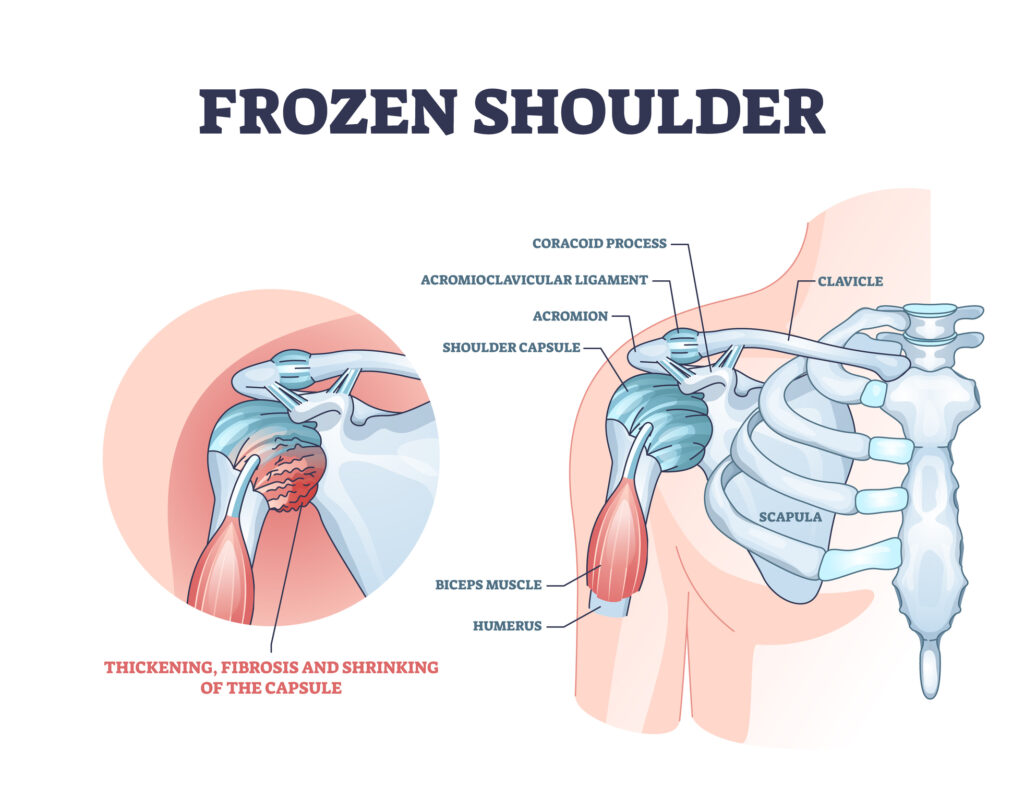
Frozen Shoulder
What is Frozen Shoulder?
Frozen shoulder, also called “adhesive capsulitis,” is an inflammatory condition of the shoulder that results in tightening of the shoulder capsular ligaments. This results in a stiff and often painful shoulder that can make it difficult to perform normal activities of daily living.

What are the Signs of Frozen Shoulder?
Pain and shoulder stiffness are the hallmark signs of a frozen shoulder. Most commonly there is a loss of external rotation range of motion in the shoulder. A frozen shoulder typically goes through three stages of symptoms that can last for a variable period of time.
Stage I (Freezing Stage) is the first stage and is the most painful. There is a progressive loss of motion in the first stage that can last from 6 weeks to 9 months.
Stage II (Frozen) is characterized by a plateau of the pain and stiffness and can last from 4 to 12 months.
Stage III (Thawing) is characterized by decreasing pain with a gradual return of motion and can last from 1 to 4 years without treatment. Although frozen shoulder usually resolves on its own with time, permanent shoulder stiffness is possible.
What Causes Frozen Shoulder?
Frozen shoulder is often caused by an injury to the shoulder that leads to an inflammatory reaction and the resultant tightening of the shoulder capsule and ligaments. It can also result from an injury elsewhere in the arm or hand if the arm is immobilized for a long period of time.

Other medical conditions are associated with frozen shoulder, but the relationship is not entirely clear. These associated medical conditions include diabetes, lung problems, adrenal disease, thyroid problems, recent chest surgery, and an extended hospitalization. Regardless of the original cause, the synovial lining of the shoulder joint thickens, and the capsular ligaments contract, limiting the range of motion of the shoulder.
What are the Treatment Options for Frozen Shoulder?
Most cases of frozen shoulder can be successfully treated with anti-inflammatory medicines, a corticosteroid injection, and a therapy program. The medication and injection help to decrease the pain and inflammation, and the therapy helps restore the joint range of motion. Occasionally for severe cases, if these methods fail to resolve the frozen shoulder, a manipulation of the shoulder under anesthesia and/or surgery may be required to release the tight capsule in the shoulder. The surgery is typically performed arthroscopically with small incisions in a minimally invasive manner.
If you have signs or symptoms of frozen shoulder feel free to call our office to schedule an appointment with one of our fellowship trained Orthopaedic hand and upper extremity surgeons that specialize in both the non-surgical and surgical treatments of hand, wrist, elbow, and shoulder problems.
Get Frozen Shoulder Relief from the Team at Raleigh Hand to Shoulder
Don’t let the pain and stiffness of a frozen shoulder hold you back. Our experts at Raleigh Hand to Shoulder Center are dedicated to helping you regain full shoulder mobility and eliminate discomfort. Call our office today or book an appointment online!

Updated 6/21/2025

